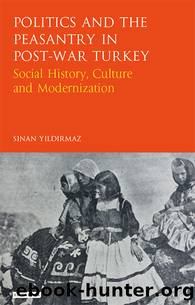Politics and the Peasantry in Post-War Turkey by Sinan Yildirmaz

Author:Sinan Yildirmaz [Yildirmaz, Sinan]
Language: eng
Format: epub
Tags: Political Science, Political Process, General, Social Science, Islamic Studies, History, Social History, Colonialism & Post-Colonialism, History & Theory, Political Advocacy, Social Classes & Economic Disparity, Sociology, Business & Economics, Taxation, Modern, 20th Century, Middle East, 21st Century, Turkey & Ottoman Empire
ISBN: 9781786720726
Google: L7mKDwAAQBAJ
Publisher: Bloomsbury Publishing
Published: 2016-11-04T01:12:41+00:00
The Peasants and Politics under the DP Government
The process of the DP's coming to power was achieved mostly with the support of the peasants. During its opposition years, the DP had been subjected to two basic problems: to gain the majority of the votes in order to obtain power and, in order to achieve that, to obtain the political participation of the majority of the masses at a desired level. The participation of the peasants in politics could only be achieved by persuading them that they could change their living conditions by using political tools. As was shown in the previous section, in this period, the peasants accepted politics as a way of changing their living conditions and became a part of politics by using it. One of the main factors that helped the DP come to power was the peasantsâ belief in the DP as a mediator of politics that would change their living conditions. In this section, the focus will be on how the relation of the peasants to politics continued during the DP government. Together with analysing the ways that the peasants established their relations with politics during this period, the meaning of the differentiation in definitions of the peasantsâ role in politics by the political power will be examined.
During the first years of the transition to the multi-party system, there was a dynamic political atmosphere shaped by the existence of the DP opposition. The DP's accession to power, at least on the peasantsâ front, slowed this dynamic political sphere. It can be observed that the peasants did not prefer direct confrontation with the administrators of political power, as had been encountered during the years the DP was in opposition. Instead of this âpeasant activism,â the effect of the DP's accession to power was seen in a change of the political discourse on the role of the peasantry in politics. The previous periodsâ discourse on the peasants was based mostly on the ideologically created âpeasants are the masters of the nationâ motto, which defined the peasants as an imagined entity. After the DP's accession to power, this discourse changed to a definition of the peasantry in which the peasants âactuallyâ existed and âactuallyâ owned political power. For example, during the hearings on the Village Law in the National Assembly, Kayseri deputy Mehmet Ãzdemir said the following:
Some of our friends have stated some wrong expressions while trying to define the peasants in law, which can create an ambiguous situation. Our peasants, thank God, are neither blind, nor deaf. Besides it is wrong to see and recognize the peasants as an unknown enigma anymore. Because the Turkish peasants, who created the revolution of 14 May, gained the great honor of it, are inside of this Assembly in person. In this respect, it is wrong to describe the peasants as another thing, show them as an unknown enigma. As I said before, the peasants are in this Assembly in person.67
This discourse was stated not only with the concern of ideological legitimacy in high politics; the peasants also started to identify themselves with politics.
Download
This site does not store any files on its server. We only index and link to content provided by other sites. Please contact the content providers to delete copyright contents if any and email us, we'll remove relevant links or contents immediately.
Asking the Right Questions: A Guide to Critical Thinking by M. Neil Browne & Stuart M. Keeley(5745)
Autoboyography by Christina Lauren(5221)
Eat That Frog! by Brian Tracy(4505)
Dialogue by Robert McKee(4379)
Sticky Fingers by Joe Hagan(4179)
Journeys Out of the Body by Robert Monroe(3607)
Annapurna by Maurice Herzog(3458)
Full Circle by Michael Palin(3435)
Schaum's Quick Guide to Writing Great Short Stories by Margaret Lucke(3368)
Elements of Style 2017 by Richard De A'Morelli(3336)
The Art of Dramatic Writing: Its Basis in the Creative Interpretation of Human Motives by Egri Lajos(3054)
Atlas Obscura by Joshua Foer(2942)
Why I Write by George Orwell(2940)
The Diviners by Libba Bray(2924)
The Fight by Norman Mailer(2919)
In Patagonia by Bruce Chatwin(2912)
The Mental Game of Writing: How to Overcome Obstacles, Stay Creative and Productive, and Free Your Mind for Success by James Scott Bell(2893)
Venice by Jan Morris(2561)
The Elements of Style by William Strunk and E. B. White(2463)
